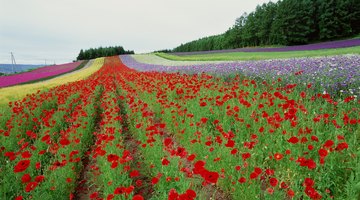From studying the physical processes of plants to how they thrive in your environment as both functional food crops and decorative flora, college degrees focused on the study of plants are varied and fascinating fields. Knowing the central aspects of each degree program can help you decide which is right for you.
Botany, Plant Biology or Plant Science
A college degree in botany, often referred to as plant biology or plant science, gives you foundational knowledge in a wide range of plant studies, including ecology, anatomy and taxonomy. In addition to classes in chemistry and physics, courses required for a major in botany can include genetics, plant diversity or physiology and molecular biology of plants. An undergraduate degree in botany can open doors to careers in research, both in the lab or on site at research locations around the world. You can also pursue an advanced degree in botany, allowing you to qualify for university teaching or research scientist positions at larger institutes.
Horticultural Science
Horticultural science undergraduate degrees center on scientific approaches to managing and maintaining modern agricultural crops. Required courses within this major can range from macroeconomics and research and business writing for the agricultural sciences to nutrition of horticultural crops and plant propagation. A bachelor's degree in horticultural science is great preparation for managing a nursery or garden center as well as a career in horticulture sales, while advanced degrees in horticulture can allow you to pursue research or college-level teaching careers.
Landscape Architecture or Planning
A field that blends horticulture with design, a degree in landscape architecture or landscape planning teaches you to create planted environments that take into account botanical welfare and site usage. In addition to general required preparation in plant science and design coursework, mandatory courses can include the history and literature of landscape design and ecological analysis. A degree in landscape architecture can help you launch a career in a variety of landscape planning capacities from the community to the regional level.
Agricultural and Food Science
A degree in agricultural and food science focuses on plants as they relate to both agricultural crops and food production, including appropriate land and water use. Typically required courses for a major in agricultural and food science include agricultural economics and rural sociology or crop management. Some agricultural science degree programs offer specialized tracks for those who wish to become teachers or independent farmers or ranchers.
Related Articles
References
- University of Florida Department of Biology: Botany Major
- University of Florida Department of Biology: Botany Course Catalog
- University of Oklahoma: What can I do with a major in Botany?
- North Carolina State: Plant Biology
- University of Florida: Horticultural Science Undergraduate Course Catalog 2013-2014
- North Carolina State University: Horticultural Science
- North Carolina State University: Landscape Architecture
- Pennsylvania State University: Agricultural Sciences Major Academic Plan
Writer Bio
Teresa J. Siskin has been a researcher, writer and editor since 2009. She holds a doctorate in art history.











